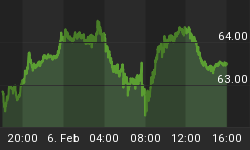The incredibly confused Fed is desperately trying to maintain its unprecedented control over the most important price signal in our economy, which is the level of interest rates. But it is failing. Mr. Bernanke not only doesn't control long-term interest rates (as he now believes) but he is also unaware that the economy has become completely addicted to Fed's level of credit creation and its ability to create asset bubbles.
Some on the Fed contend inflation is too low, while others want to begin tapering immediately.
From the Fed's Statement released last week: "The Committee sees the downside risks to the outlook for the economy and the labor market as having diminished since the fall."
Mr. Bernanke also stated that if the economic conditions continue to improve, the Fed would begin tapering QE in the fall and could terminate the program by mid-2014. However, that very same day, the Federal Reserve also trimmed its growth forecast for 2013 and slashed its inflation outlook...going against both its mandates!
The economy is now expected to grow at an annual rate of 2.3-2.6 percent, slightly below the 2.8 percent top-end growth previously forecast. It also projected inflation would come in between 0.8-1.2 percent in 2013, instead of 1.3-1.7 percent seen in March. Keep in mind, Mr. Bernanke thought inflation and growth were so anemic only six months ago that the he started buying $85 billion worth per month of unsterilized MBS and Treasuries. And now he wants to start taking all that QE away, even though he has simultaneously downgraded the outlook for growth and inflation.
Bernanke is completely confused; but markets are not. The yield on Ten-Year soared to 2.67% by Monday.
The aggressive tapering laid out by the Fed would crush bonds, real estate, equities and the economy because the $54 trillion in total U.S. debt cannot be easily serviced without perpetually low interest rates. Investors should now be laser focused on future economic news. Unless the data is profoundly weak, the Fed's taper will begin on schedule in the fall. I believe Mr. Bernanke wants to leave at year's end and is now working on his legacy. Bernanke wants to say he started to reverse his unprecedented stimulus and returned the economy on a path towards free markets. But our central bank would not be tapering into strong economic growth, as they would like you to believe, but instead because of the fear that Fed has simply gone too far.
Bernanke may be making a tacit admission that five year's worth of interest rate manipulation and credit creation has done all it is able to do for the economy and the size of the Fed's balance sheet has become too daunting.
Investors need to be on red alert and get defensive until the data turn decidedly negative. Expect violent moves between deflation and inflation going forward. When the next recession looms (perhaps in early 2014) the Fed will announce the tapering strategy has been put on ice and the rebuilding of the Fed's balance sheet has recommenced. Asset bubble blowing will once again become in vogue and the markets can start to celebrate the re-inflation of equity prices. However, the middle class will once again suffer, as they witness their purchasing power and standard of living further erode.















